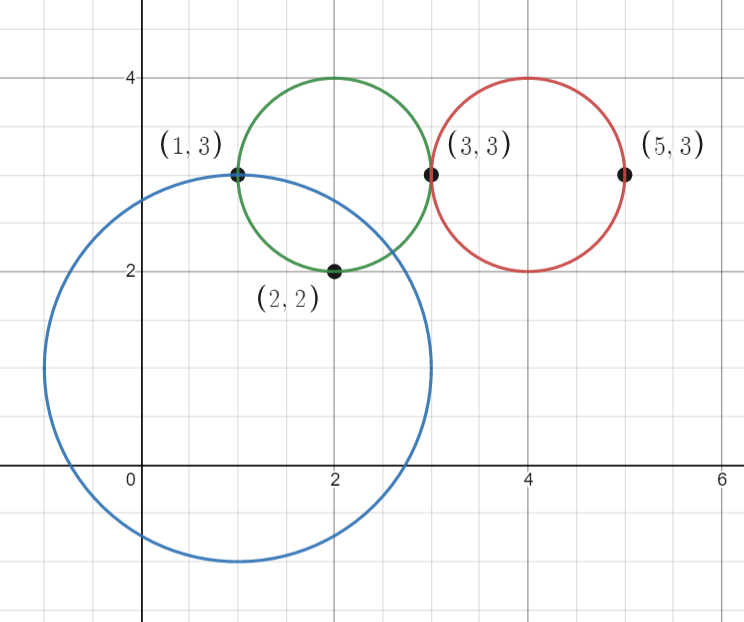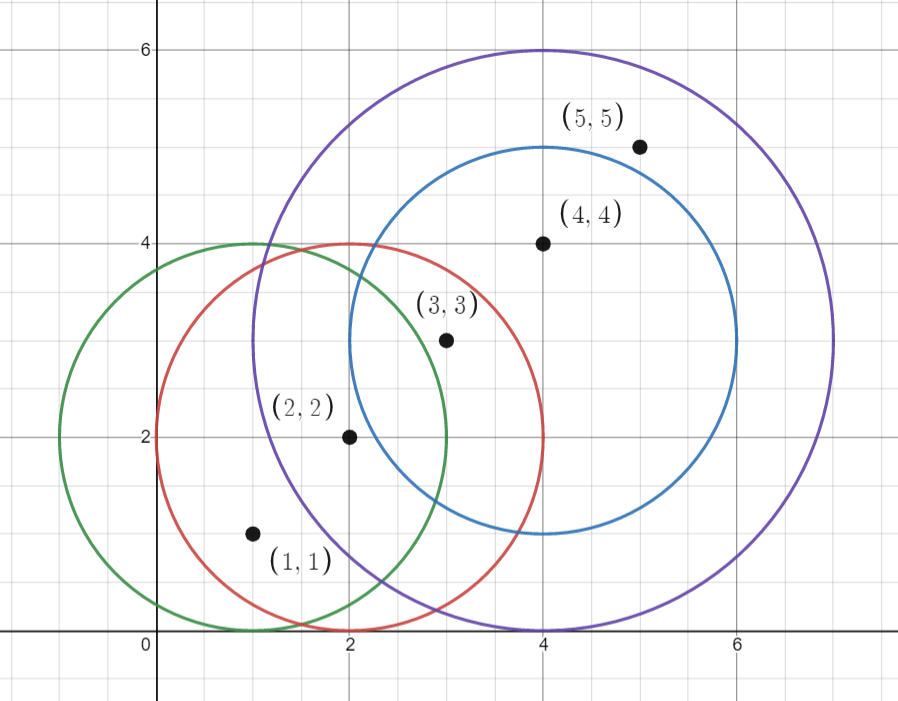You are given an array points where points[i] = [xi, yi] is the coordinates of the ith point on a 2D plane. Multiple points can have the same coordinates.
You are also given an array queries where queries[j] = [xj, yj, rj] describes a circle centered at (xj, yj) with a radius of rj.
For each query queries[j], compute the number of points inside the jth circle. Points on the border of the circle are considered inside.
Return an array answer, where answer[j] is the answer to the jth query.
Example 1:
Input: points = [[1,3],[3,3],[5,3],[2,2]], queries = [[2,3,1],[4,3,1],[1,1,2]] Output: [3,2,2] Explanation: The points and circles are shown above. queries[0] is the green circle, queries[1] is the red circle, and queries[2] is the blue circle.
Example 2:
Input: points = [[1,1],[2,2],[3,3],[4,4],[5,5]], queries = [[1,2,2],[2,2,2],[4,3,2],[4,3,3]] Output: [2,3,2,4] Explanation: The points and circles are shown above. queries[0] is green, queries[1] is red, queries[2] is blue, and queries[3] is purple.
Constraints:
1 <= points.length <= 500points[i].length == 20 <= xi, yi <= 5001 <= queries.length <= 500queries[j].length == 30 <= xj, yj <= 5001 <= rj <= 500- All coordinates are integers.
Follow up: Could you find the answer for each query in better complexity than O(n)?
class Solution:
def countPoints(self, points: List[List[int]], queries: List[List[int]]) -> List[int]:
ans = []
for x0, y0, r in queries:
count = 0
for x, y in points:
dx, dy = x - x0, y - y0
if dx * dx + dy * dy <= r * r:
count += 1
ans.append(count)
return ansclass Solution {
public int[] countPoints(int[][] points, int[][] queries) {
int[] ans = new int[queries.length];
int i = 0;
for (int[] query : queries) {
int x0 = query[0], y0 = query[1], r = query[2];
for (int[] point : points) {
int x = point[0], y = point[1];
int dx = x - x0, dy = y - y0;
if (dx * dx + dy * dy <= r * r) {
++ans[i];
}
}
++i;
}
return ans;
}
}function countPoints(points: number[][], queries: number[][]): number[] {
let ans = [];
for (let [cx, cy, r] of queries) {
let square = r ** 2;
let count = 0;
for (let [px, py] of points) {
if ((px - cx) ** 2 + (py - cy) ** 2 <= square) {
++count;
}
}
ans.push(count);
}
return ans;
};class Solution {
public:
vector<int> countPoints(vector<vector<int>>& points, vector<vector<int>>& queries) {
vector<int> ans;
for (auto& query : queries) {
int x0 = query[0], y0 = query[1], r = query[2];
int count = 0;
for (auto& point : points) {
int x = point[0], y = point[1];
int dx = x - x0, dy = y - y0;
if (dx * dx + dy * dy <= r * r) {
++count;
}
}
ans.push_back(count);
}
return ans;
}
};func countPoints(points [][]int, queries [][]int) []int {
ans := make([]int, len(queries))
for i, query := range queries {
x0, y0, r := query[0], query[1], query[2]
for _, point := range points {
x, y := point[0], point[1]
dx, dy := x-x0, y-y0
if dx*dx+dy*dy <= r*r {
ans[i]++
}
}
}
return ans
}

